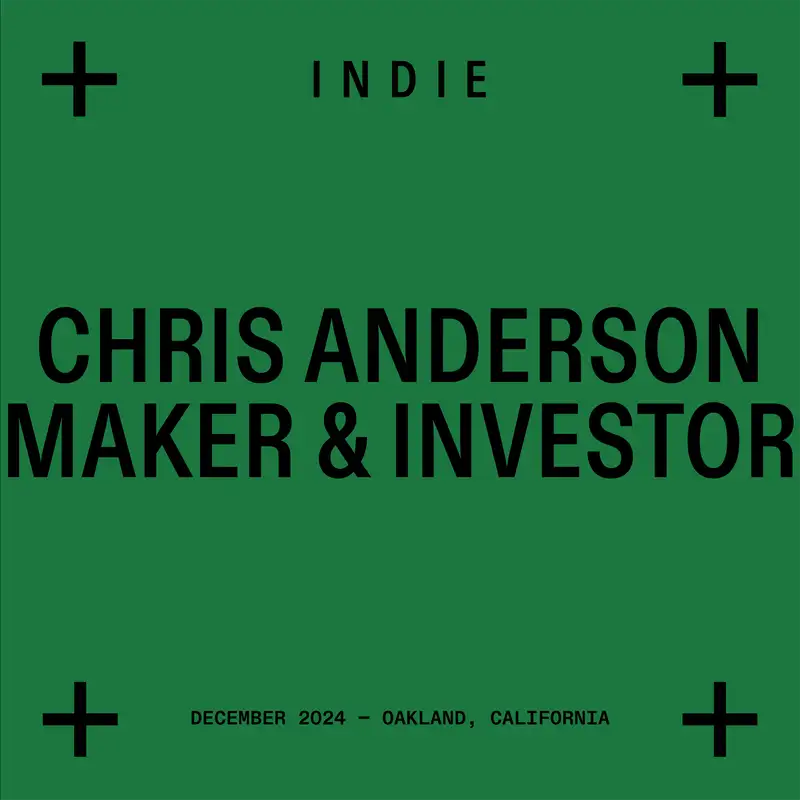
Drones, Defense Tech, and The Consumer Hardware Trap with Chris Anderson
Chris Anderson can’t talk a lot about what he is up to these days. At least on camera.
His LinkedIn profile says he’s currently an Engineer at “Stealth". Prior to this current professional opacity, he was at Kitty Hawk, the electric aircraft maker founded by Sebastian Thrun (legendary Stanford Professor and former lead of Google’s self-driving car team that led to Waymo) and backed by Google Co-founder, Larry Page.
I became familiar with Chris while he was leading Wired Magazine as Editor-in-Chief. His work there was groundbreaking and set much of the pace, tone, and agenda for the early days of Web 2.0 and the Maker movement. After seeing a TedX talk about a side hustle he had selling cellophane bags of electrical parts and open source autopilots for DIY Drones I slid into his DM’s.
There is a lot of buzz around drones today, but note the date on that DM — November 3rd, 2010.
Little did I know at the time, that this little drone business was just beginning to grow from Chris and his kids packing orders at their dinner table to a proper manufacturing and distribution center along the border of Mexico.
As things happened, that DM turned into a conversation that turned into an investment in a company, 3D Robotics, that took Chris away from Wired and into the uncharted worlds of manufacturing, consumer hardware, and defense tech. He was early and 3DR didn’t play out the way that we’d all hoped but it laid the foundations for much of what he’s working on now — even though he can’t talk much about that publicly.
To say Chris has a knack for living in the future would be a massive understatement.
In this conversation we unpack his process for exploring possible futures — spoiler: Chris has started writing science fiction as a way to explore complex technological implications. He writes a book a month, using fiction as a computational tool to play out scenarios with artificial agents and see where they lead. We get into what he got right and what he got wrong about drones specifically and defense tech more broadly. And we discuss the culture of Silicon Valley, where we spar a bit on the amount of waste and wandering built into the system that ultimately leads to so many unexpected breakthroughs.
Since that first DM, he has become a dear friend, coconspirator, and sounding board for me. The unedited conversation here went on for nearly 3 hours (which reminds me that we really do need an “indie uncut” channel) but that’s the kind of person Chris is — generous in sharing his time, ideas, and insights.
I hope you enjoy listening as much as we enjoyed recording this one.
His LinkedIn profile says he’s currently an Engineer at “Stealth". Prior to this current professional opacity, he was at Kitty Hawk, the electric aircraft maker founded by Sebastian Thrun (legendary Stanford Professor and former lead of Google’s self-driving car team that led to Waymo) and backed by Google Co-founder, Larry Page.
I became familiar with Chris while he was leading Wired Magazine as Editor-in-Chief. His work there was groundbreaking and set much of the pace, tone, and agenda for the early days of Web 2.0 and the Maker movement. After seeing a TedX talk about a side hustle he had selling cellophane bags of electrical parts and open source autopilots for DIY Drones I slid into his DM’s.
There is a lot of buzz around drones today, but note the date on that DM — November 3rd, 2010.
Little did I know at the time, that this little drone business was just beginning to grow from Chris and his kids packing orders at their dinner table to a proper manufacturing and distribution center along the border of Mexico.
As things happened, that DM turned into a conversation that turned into an investment in a company, 3D Robotics, that took Chris away from Wired and into the uncharted worlds of manufacturing, consumer hardware, and defense tech. He was early and 3DR didn’t play out the way that we’d all hoped but it laid the foundations for much of what he’s working on now — even though he can’t talk much about that publicly.
To say Chris has a knack for living in the future would be a massive understatement.
In this conversation we unpack his process for exploring possible futures — spoiler: Chris has started writing science fiction as a way to explore complex technological implications. He writes a book a month, using fiction as a computational tool to play out scenarios with artificial agents and see where they lead. We get into what he got right and what he got wrong about drones specifically and defense tech more broadly. And we discuss the culture of Silicon Valley, where we spar a bit on the amount of waste and wandering built into the system that ultimately leads to so many unexpected breakthroughs.
Since that first DM, he has become a dear friend, coconspirator, and sounding board for me. The unedited conversation here went on for nearly 3 hours (which reminds me that we really do need an “indie uncut” channel) but that’s the kind of person Chris is — generous in sharing his time, ideas, and insights.
I hope you enjoy listening as much as we enjoyed recording this one.